|
Atterbury-Bakalar Air Museum
Ernie Pyle WWII Museum
Five Points Fire Museum
Fort Wayne
Firefighters Museum Freeman
Army Airfield Museum
Virgil "Gus"
Grissom Memorial
Hoosier Air Museum
Indiana Military
Museum
Indianapolis Fire Museum McClain
Military Museum
Military Honor
Park and Museum
Museum of the Soldier
National
Military History Center/Automotive and Carriage Museum National
Model Aviation Museum
Rolls-Royce Heritage Center, Allison Branch
Ropkey Armor Museum
Stutz Car Museum
Wayne County
Historical Museum
Indiana Museums -
Aviation, Military, Automotive and Fire
National Military History Center/Automotive and Carriage Museum
Auburn, IN
Author's update
6-7-2021: The Military Museum is now completely closed and all of
the equipment has all been disposed of. I will keep this page open
to show what used to be a really cool museum. The narrative below
tells what how this all ended badly.
Author's update 11-17-2017: Yesterday I returned to
the museum to find that the military collection described below was
pretty much non existent. There was one half track, one CCKW-352,
a Packard, a Dodge command car, and two Vietnam era gun trucks on
display. While the museum in 2014 had suffered a hemorrhage of the
equipment, there still was a decent amount and some interesting items to
look at. Not any more. I do not recommend anyone wasting
their time and money visiting this museum. DDJ 11-17-2017
I will make comments below in red on what I found in yesterday's visit.
It must have seemed like a
good idea at the time in 2001. Spend $35 million to purchase the
assets of a failing military museum in Belgium, (That should have been
the first warning of problems to come.) and build a 192,000 square foot
military vehicle and automobile museum along I-69 just south of Auburn,
IN. Previously known as the Victory Museum, the now renamed National
Military History Center opened in 2003 to great and unrealistic
expectations that never materialized. What also appear to be not
so well thought out business decisions made by the chief benefactor of
the Museum complex have not helped the financial situation since then.
Dean Kruse, who for many
years owned the very successful Kruse Auto Auction on the east side of
the south Auburn, IN exit on I-69, sold out to Ebay in 2001, and then at
the same time purchased the assets of the Victory Memorial Museum in
Arlon, Belgium which had closed in 1998, and included 150 pieces of WWII
military equipment from 11 countries.
I have included four links
below that tell the story of the Kruse Museum complex in Auburn better
than I can.
The Opening of the Museum The beginning in 2003.
Here is a link to an
article on the DeKalb zoning board meeting that approved the building of
the museum.
Zoning Board Meeting The date shows 2012 but it would have
been in 2001.
Note there is talk of
hotels and development at this intersection. It never happened.
All of the hotels, gas stations and restaurants are two miles to the
north, which itself has grown since 2003. Mr. Kruse, no doubt saw
all of the traffic going up and down I-69 and thought a percentage of it
would stop in to see his museum and make it successful. Maybe
that's why the parking lot for the museum runs the entire length of the
building and can hold hundreds of vehicles. The most I have ever
seen in the lot in my many travels up and down I-69 and by the museum is
a dozen or so.
What Mr. Kruse did not realize, is yes, there is a
lot of traffic on the interstate, but those persons traveling, like
myself that have driven it hundreds of times going to and back from
Michigan, are focused on getting to the final destination. This
part of I-69 in northern Indiana is a stretch of road to put behind
one's self on his journey. And if one does need to stop in the
area for fuel or to eat, it will be the next exit to the north. And when finished,
one is going to get back on the road again and make tracks for home or
somewhere else he needs to be.
Andy Granatelli Building It was the Andy Granatelli building
that broke the back of the National Military History Center.
The Sale Details of the Auction of the 2012 auction.
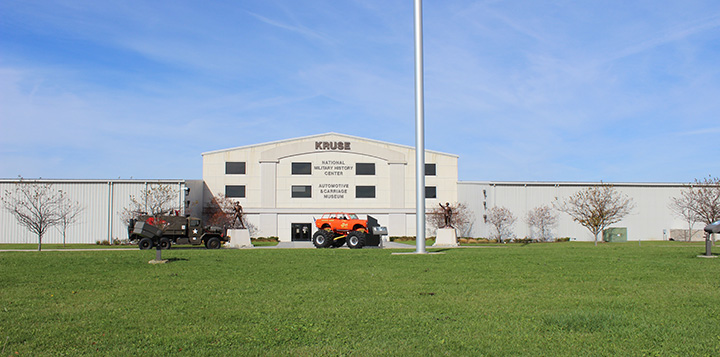
This photo show but a small part of the 192,000 square foot main museum
building that holds the National Military History Center to the left or
south of the entrance and lobby, and the Automotive and Carriage Museum
to the right or north. 192,000 equates to 4.4 acres which makes
this museum building second in size only to the Indiana State Museum in
downtown Indianapolis, which covers 270,000 square feet.
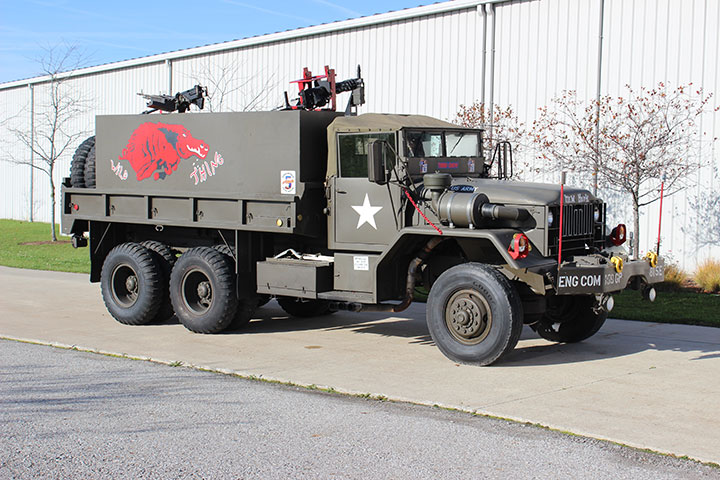
This Vietnam Era gun truck "Wild Thing" is normally on display inside
the museum and is on loan from a private owner. I have seen it at
various events in the area. It was placed outside for a military
collectors' show that was going on the Sunday in October, 2014 I visited
the museum last.
11-17-2017 update: This is one of the two
gun trucks on display inside the museum.
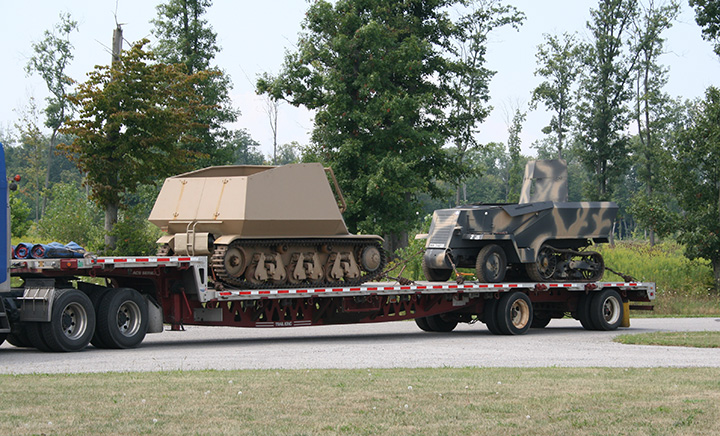
In August of 2013 when I visited the museum
for the first time in several years, this is what I was greeted with as
I entered the parking lot. As will be shown below, the
hemorrhaging of military equipment still continues at the National
Military History Center.
The National Military History Center
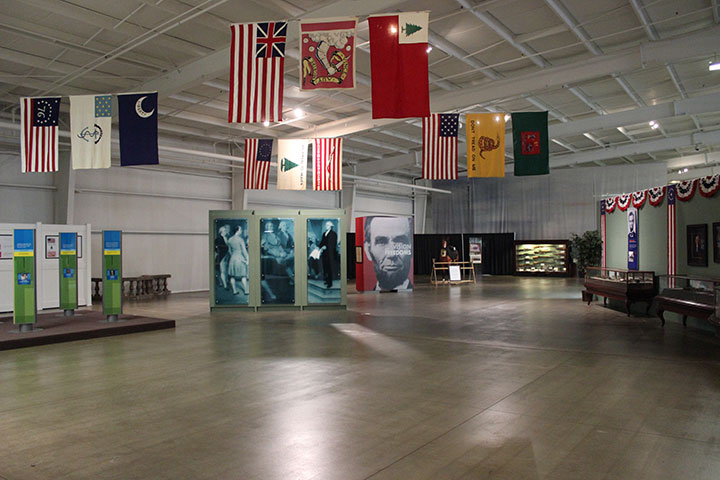
Entering the National Military Heritage Center one is greeted by a few
displays but mostly empty space. Note that the floor has a
laminate laid down. Some local floor contractor thought he had died and gone
to heaven when he got this job.
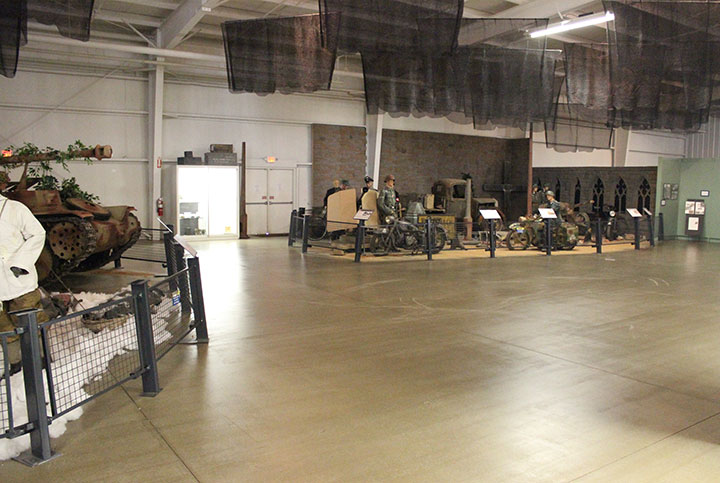
Passing out of the first display area into the next, one finds a
selection of German military equipment from WWII around the walls.
Still lots of empty floor space in the middle.
11-17-2017 update: The collection just shown
on the left was gone. The one with the motorcycles was still
there.
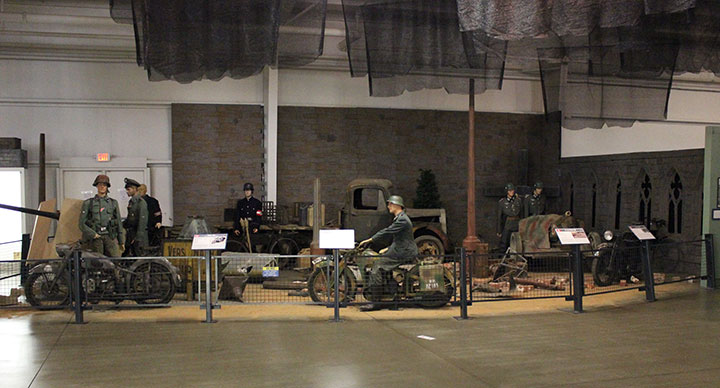
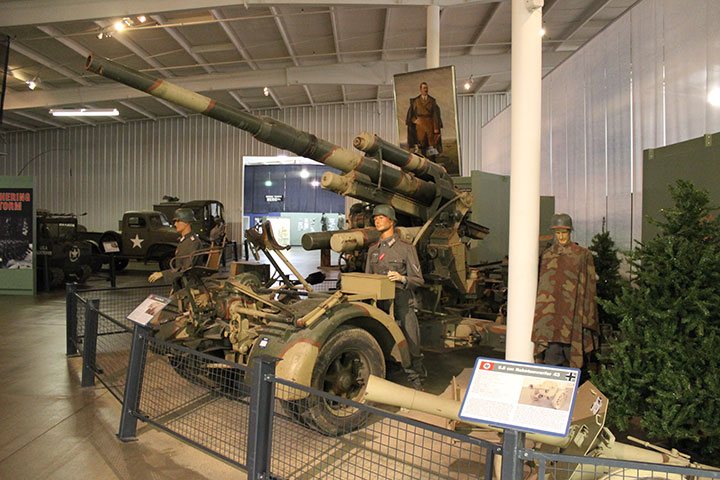
The highlight of this area is this German "88" anti-aircraft gun.
11-17-2017 update: This was gone.
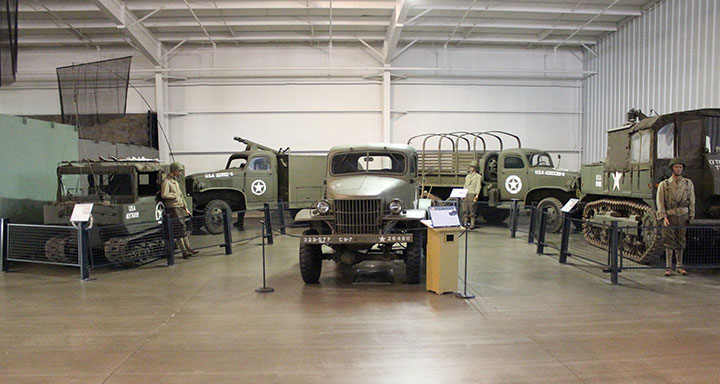
The Dodge WC-1 1/2 pickup truck, of which only 2,575 were built, located
in the center is on loan from an individual and sits in the location
where a Willys Jeep was before. The Studebaker Weasel, Chevrolet
1-1/2 ton telephone pole setter truck, the GMC 2-1/2 ton truck and
International M5 tractor are all part of the original collection brought
over from Belgium.
11-17-2017 update: All of this was gone with
the exception of the CCKW-352.
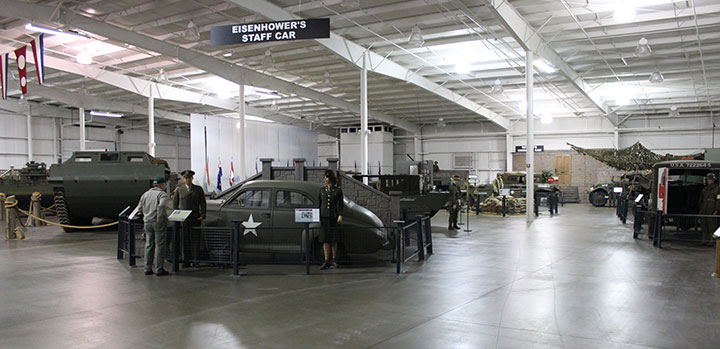
Walking through the door in the firewall at the south end one finds this
collection of vehicles. There were some changes and deletion of
displays from my last trip. Eisenhower's Staff Car in previous
trips was along the far, or west wall. It replaced a Ford
amphibious jeep, or Seep, that had been located there, and the Seep was
nowhere else in the Museum.
11-17-2017 update: This area was closed off
permanently to the public and appeared to be a workshop area. Only
the Packard in the foreground remained of all of the vehicles in this
section.
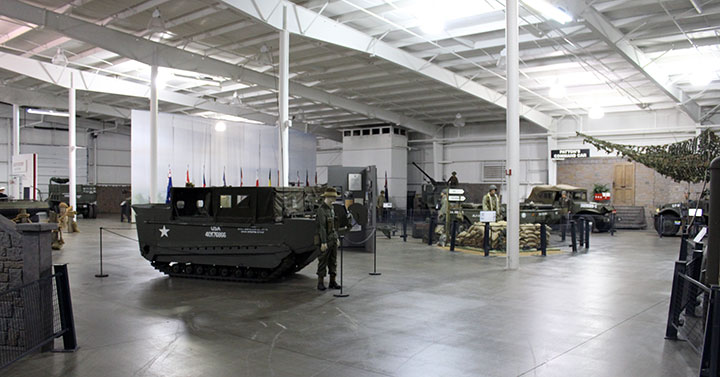
This area differs from the previous area in that it is fully lit.
It is hard to see but in the left hand corner of the photo is a military
truck sitting in front of the overhead door. I have to assume
since it had moved from its earlier display location it had and had been
sold and was awaiting its new owner to pick it up.
11-17-2017 update: Gone.
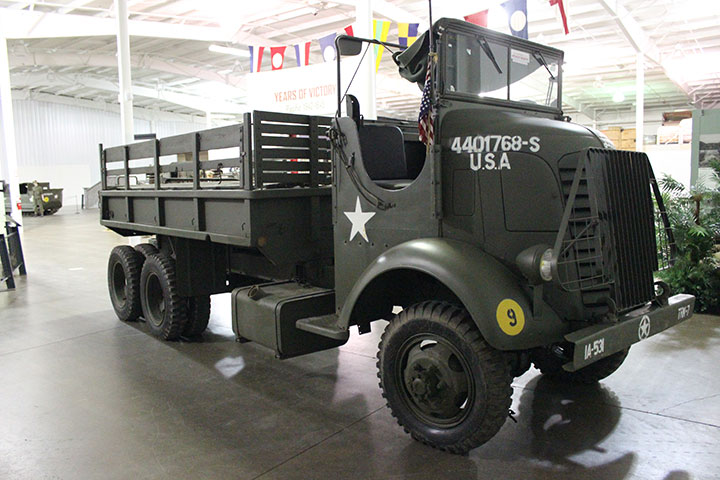
The truck in question was this rare 1942 Yellow Truck and Coach
AFKWX-363 Cab over Engine 2-1/2 ton truck. Yellow became GMC later
in the war on September 30, 1943. Only 6,621 of these were built
during WWII. Having a 15 foot bed allowed it to carry lighter,
bulkier loads than the CCKW-353 2-1/2 ton trucks with twelve foot beds.
The GMC DUKW that this vehicle shared display space with was also
missing. Both were purchased in the auction by a new museum in
Chicago, the National Veterans Museum. Apparently there was a lag
between purchase and the time of pickup. The question gets to be:
Is all of the rest of the equipment still in the museum already sold,
and just waiting for the owner to pick it up?
11-17-2017 update: Gone.
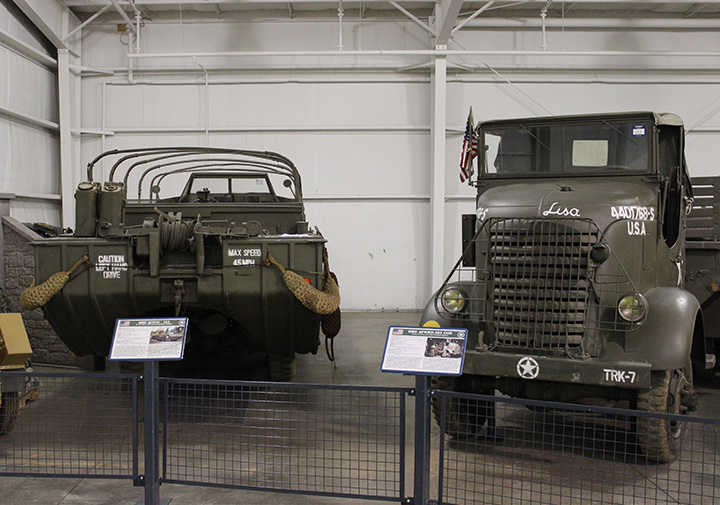
The DUKW and AFKWX on my previous visit.
The DUKW sold for over $100,000.
11-17-2017 update: Gone.
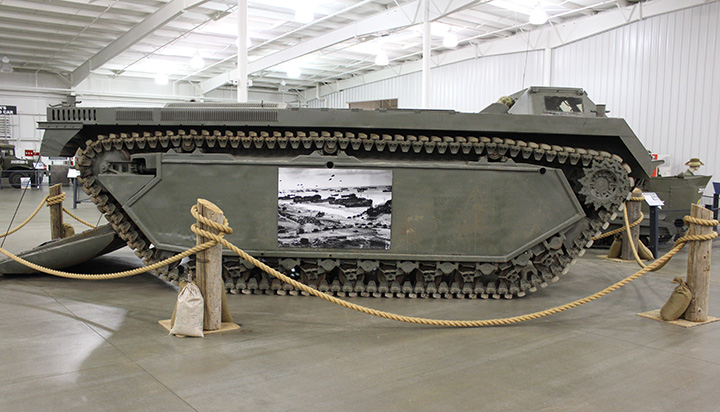
This LVT(3) (Landing Vehicle, Tracked) was one of 2,962 built during the
Second World War for the US Marine Corps and Army. Each of this series
was powered by two Cadillac V-8 engines with Hydro-Matic transmissions.
This very rare display will hopefully stay the the museum. I took
this photo on my previous trip and one can see in the background the
front end of the Seep that is no longer on display.
11-17-2017 update: Gone. This was such
a cool display.
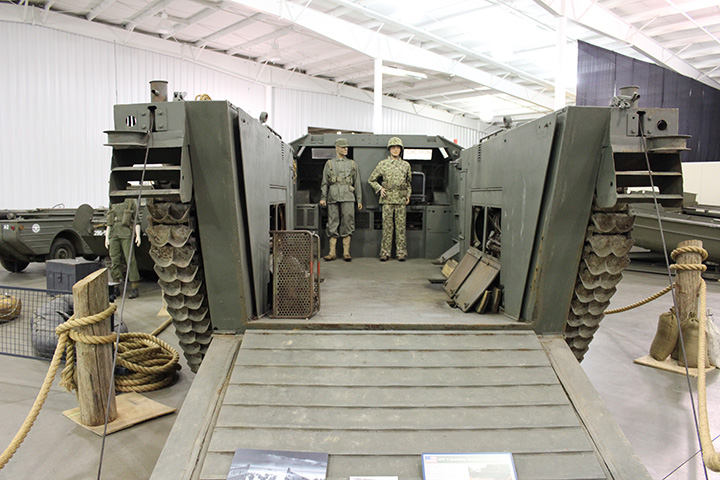
This photo was also from a previous trip and
shows the cover plates off of the engine and transmission locations on
the sides. All of the other of the over 20,000 LVTs built had
radial aircraft engines located behind the driver's compartment in
front. Note the Seep on the left side of the photo that is no
longer at the museum.
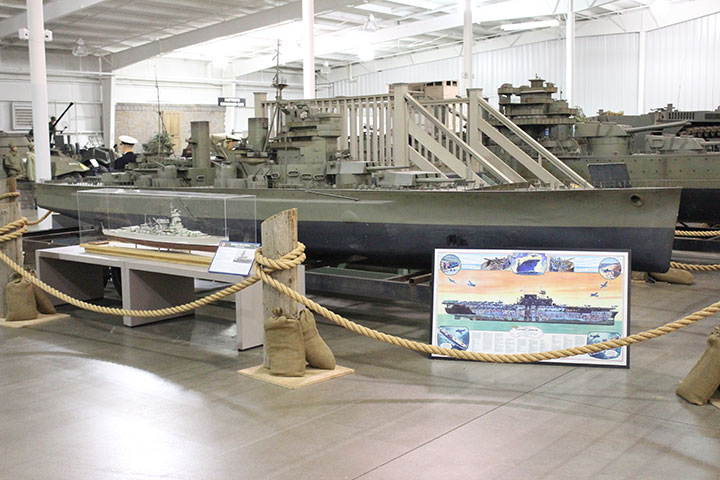
Two of the props build for the TV mini-series "Winds of War" are on
display in the area. This prop represents the HMS Prince of Wales.
11-17-2017 update: This is still there.
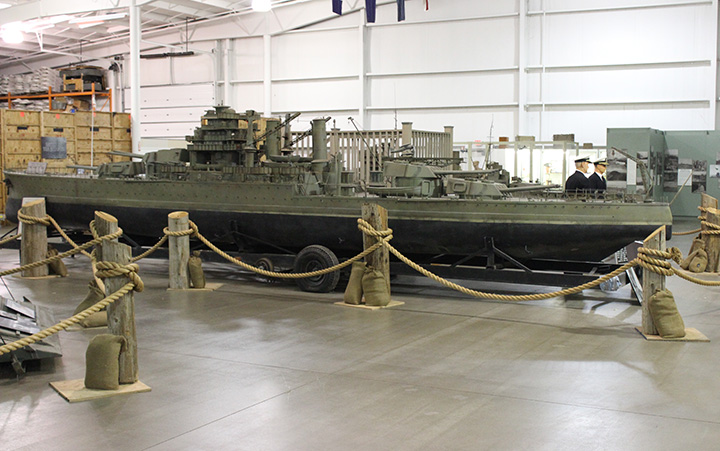
This mini ship from the TV series is the USS Tennessee.
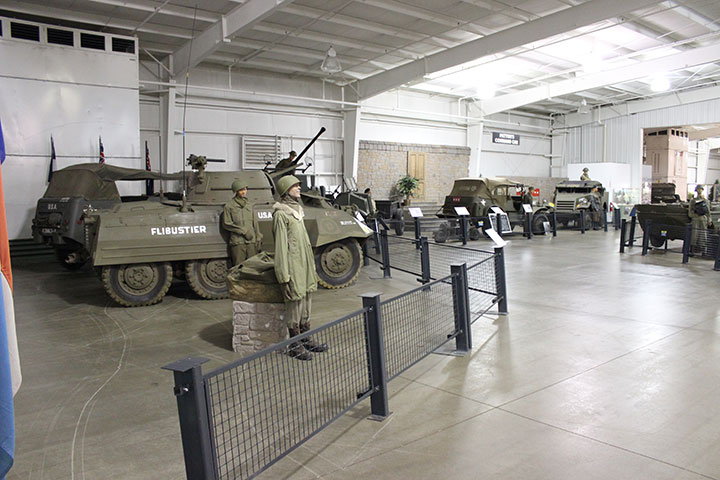
A photo of the west side of this section of the building there is a
soldier mannequin standing in the foreground. There used to be a
White Halftrack located there.
11-17-2017 update: One of the Dodge command
cars is still on display as is the half track.
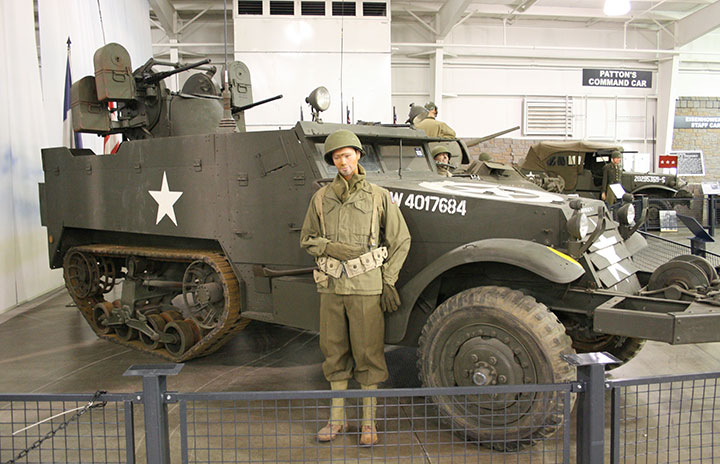
This is the White M16 Halftrack that was in
the location on previous visits. This also sold for over a
$100,000 to the National Veterans Museum.
11-17-2017 update: This half track was gone.
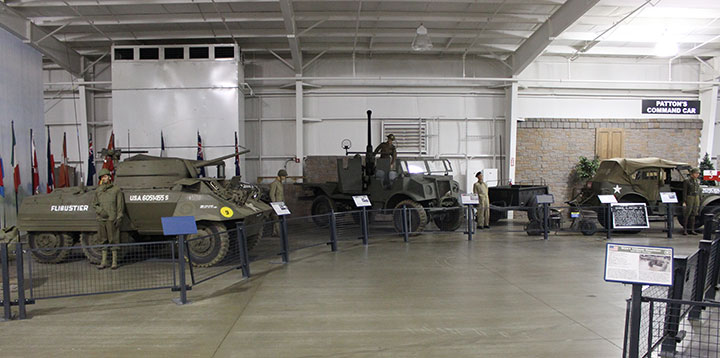
In the center is one of 209,000 Canadian Military Pattern Trucks that
was built by Ford of Canada. It was previously in the center of
the floor, and replaced Eisenhower's staff car that moved the spot where
the Seep was.
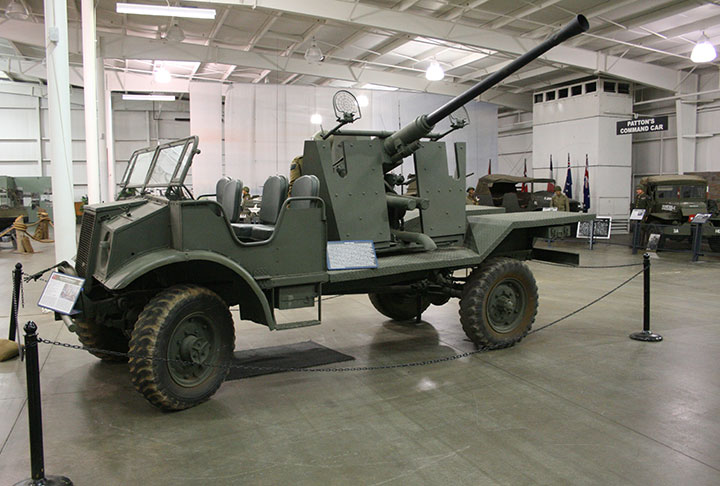
This photo taken from another earlier visit
shows a close-up view of the Canadian Military Pattern Truck. The
reason it was named as such is that both Ford and Chevrolet built the
same vehicle and parts were interchangeable between the two. This
is the only one of its type I have seen to date, and is one of the
reasons this museum still really has some unique displays in it.
At least for now.
11-17-2017 update: This was gone. This
was a very raw piece of equipment. I will miss it.
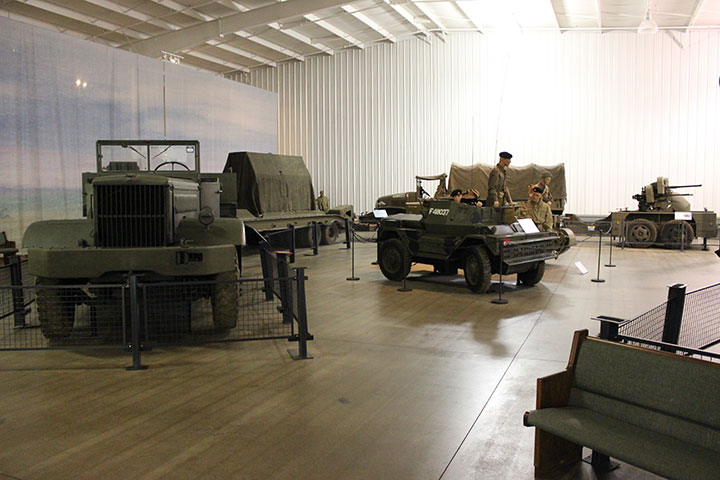
Moving back through the fire wall one finds a Daimler Ferret Scout car,
a Diamond T M20 12-ton prime mover with an M9 45 ton tank trailer, and
another GMC 6x6 2-1/2 ton truck pulling a quad 50. machine gun trailer.
All part of the original collection.
11-17-2017 update: Gone.
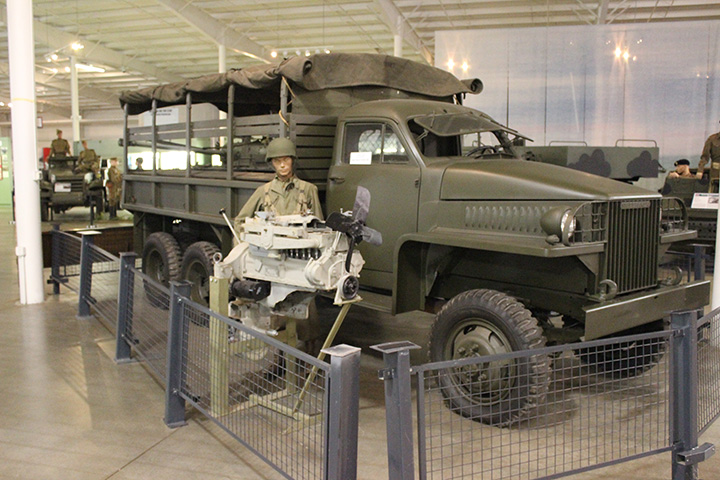
This very rare Studebaker 2-1/2 ton truck is
on loan from the Studebaker Museum in South Bend, IN. It is rare
for two reasons; the first is that is was never driven after being
built, and second because all of the Studebakers were Lend Lease and
most went to the Soviet Union and never came back. The a cut-away of
a Hercules engine that powered the truck is also on display.
11-17-2017 update: Only the engine remains.
I have to assume the truck went back to the Studebaker Museum.
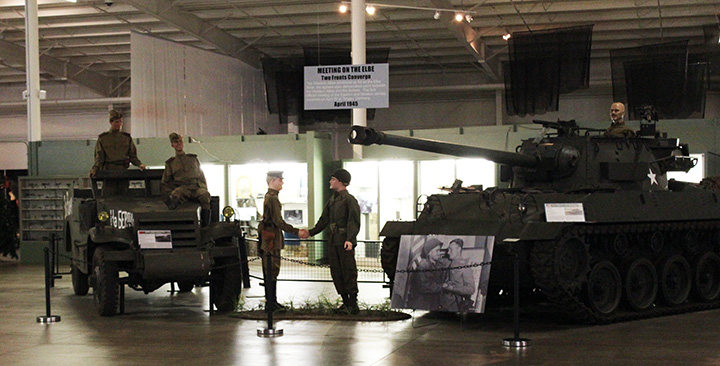
The only piece of US armor in the museum is this Buick built M18 Hellcat
Tank Destroyer. For some reason on this trip the M18 commander has
his headgear missing. Buick in Flint, MI did all of the final
assembly of all of the 2,507 M18s built. What is not known is that
the Fisher Body Division of GM built most of the turrets and 40% of the
hulls at both its Flint and Grand Blanc, MI plants. Here the M18
is seen in diorama with a White Scout car of the meeting of Russian and
American troops meeting at the Elbe River near Torgau, Germany on April
25, 1945.
11-17-2017 update: The M18 was the
centerpiece of the museum. Both it and the scout car are gone.
But the American and Russian soldiers are still standing there shaking
hands. Very strange.
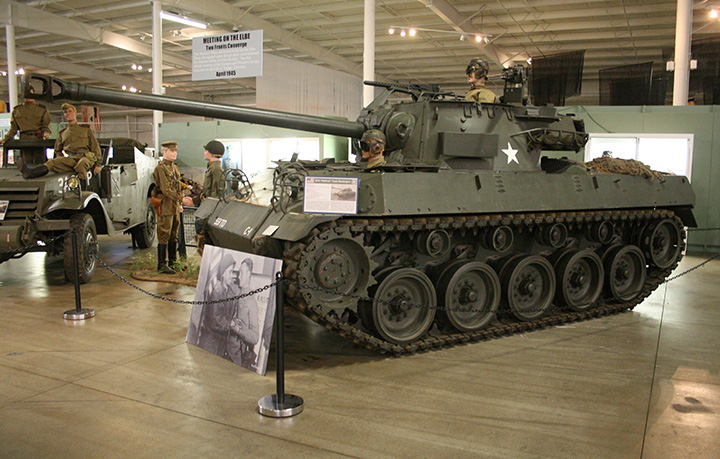
This photo from an earlier trip shows the
tank commander with his helmet on. Also there was a driver at that
time also.
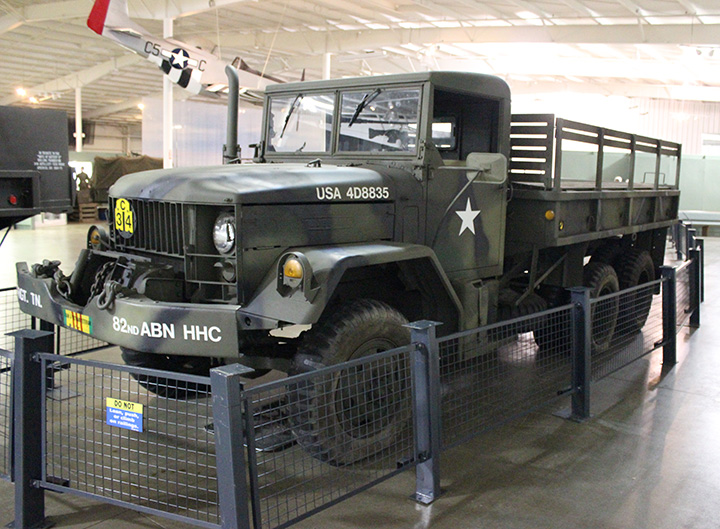
Also in this museum is a collection of antique tractors and several
Vietnam era trucks, which are loaned to the museum and also seem to be
in a state of flux. This 1962 M35A1 was built by Studebaker-Packard in
nearby South Bend, IN, having received the military contract for the
trucks in 1960. Because of financial difficulties,
Studebaker-Packard sold the military truck business in early 1963 to
raise cash for its ailing auto business to Kaiser-Jeep Corporation,
which then continued building the trucks in the same factory.
Studebaker still failed in December of 1963.
11-17-2017 update: This was gone.
In the background is a large scale model of
a P-51D Mustang which is the only aircraft related article in the
museum.
I really like visiting this museum and hope
that it can get itself back on its feet financially, and bring in some
more borrowed equipment for interested persons to view. But I have
my doubts. Just the operating costs have to be horrendous.
The museum is open year around and is heated in the winter and cooled in
the summer. Just the costs for climate control in this structure
have to be unbearable. There have been occasions when I have been
there I am the only visitor in the building. The museum can not
cover its operating costs from the small amount of persons that visit
each year.
The Automotive and Carriage Museum
The paid admission allows the visitor to view both museums.
11-17-2017 update: The rest of the museum is
as it was. But this is of no real interest to me.
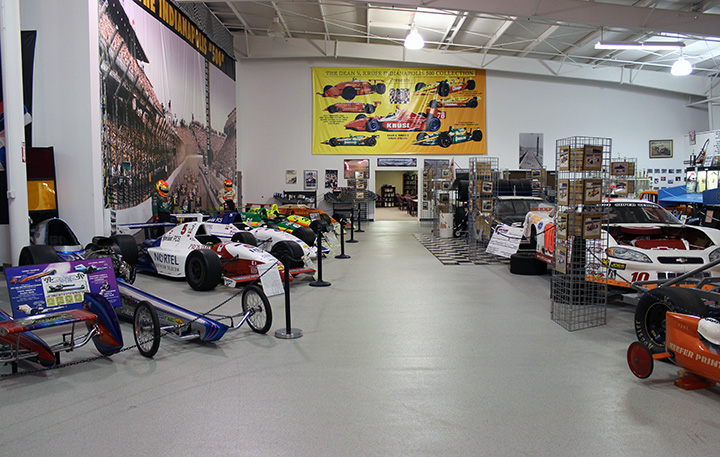
Crossing back through the lobby one passes through the museum library
seen through the door in the background. This section of the
museum is dragsters and race cars. Most of the vehicles in this
museum are loaned to the museum for display by their owners.
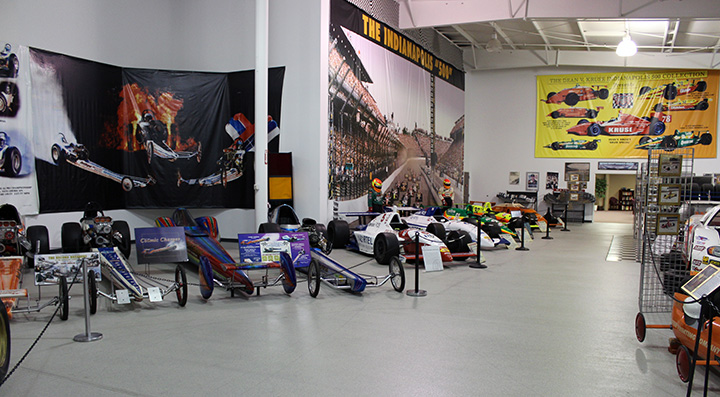
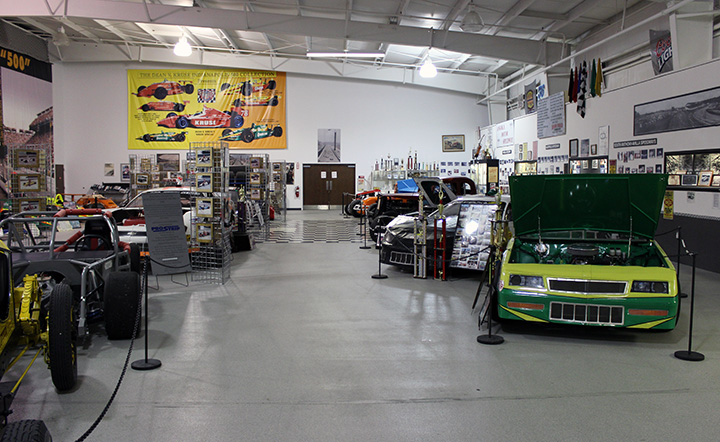
There is no wasted space in this museum.
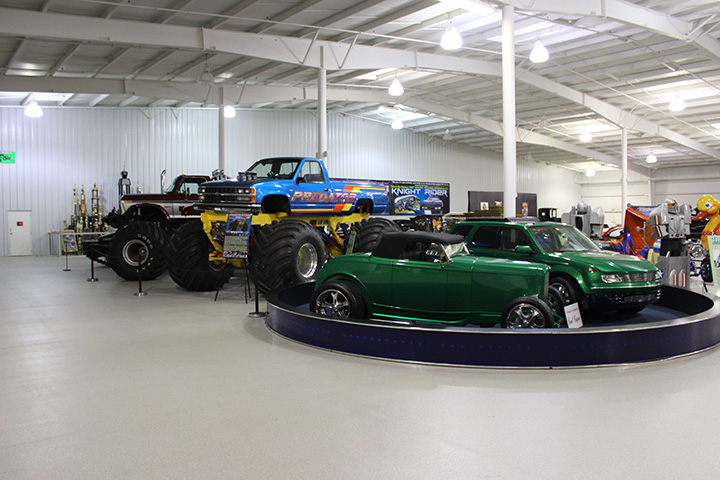
Monster trucks are a new addition to the museum.
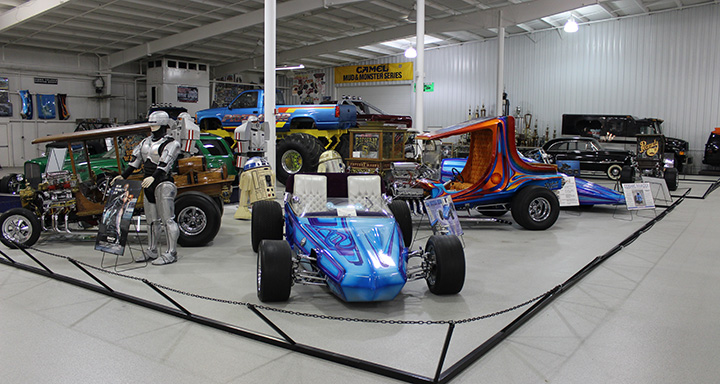
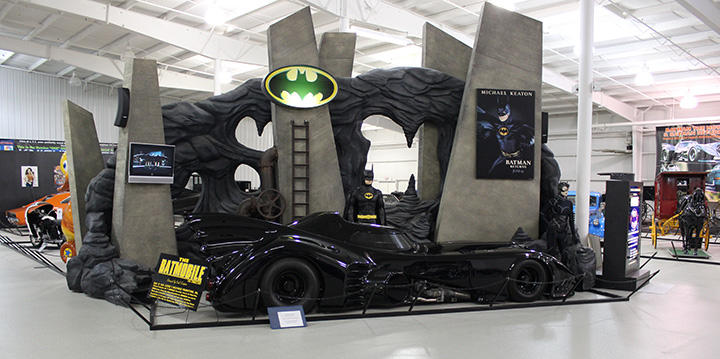
This Batmobile is one of three that were built. Down the aisle to
the left is one of the Dukes of Hazzard's cars used in that TV series.
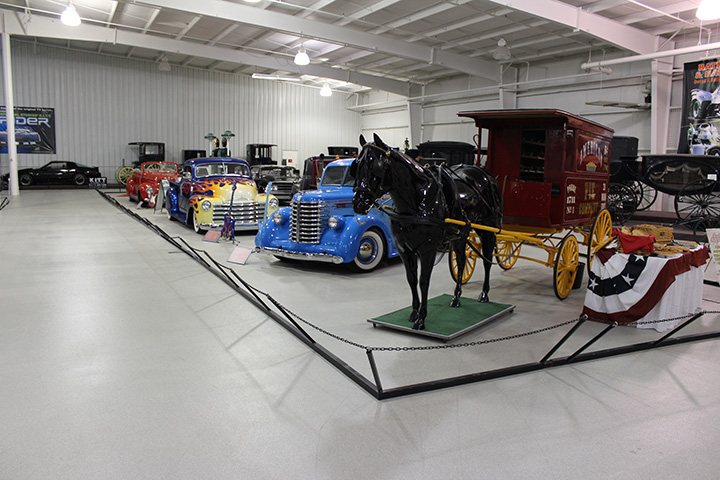
Due to the vehicles being privately owned, the displays change over time
and can not be sold to raise cash.
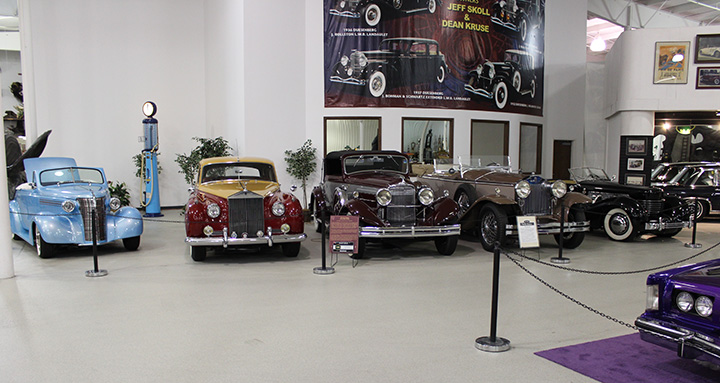
There are some classics on display also.
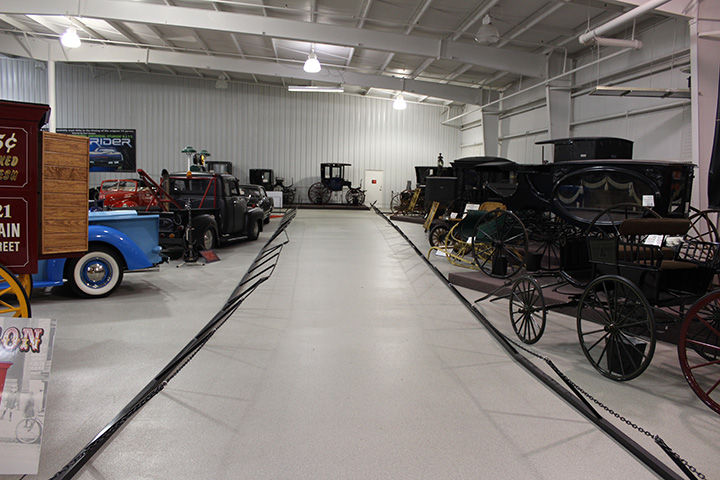
Carriages are located on the east wall.
|

































